Finding the Way – New Life in Benin
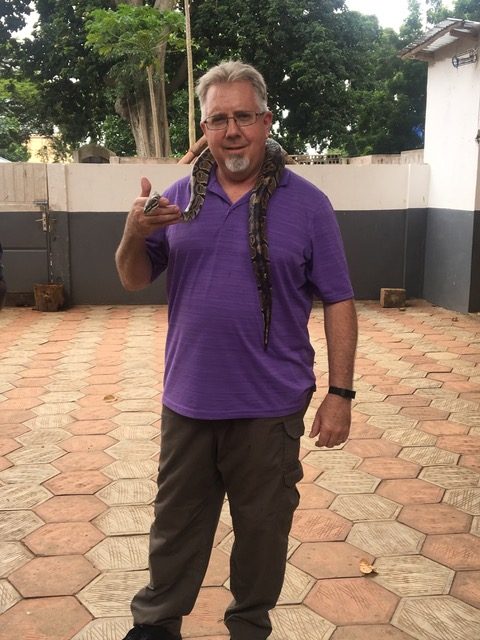
We stood before a tree. The base was both stained and marred. The man before me who told the story spoke in a sullen tone with lifeless expression. Above his eyes in the center of his forehead there were two distinct self-inflicted scars to look like fangs. On each cheek was the same dark sign that he was among the worshippers of the Python. He spoke of the annual ceremony where the sheep would be tied to this tree then slaughtered as a sacrifice to the voodoo god. A serpent, a royal python that has become the symbol of the beliefs of the people of Ouidah on the coast of Benin.
After seeing the small hut that represents the purification chamber and then the other hut that was the protection chamber that the chief priest would pass through, then they told us to take off our shoes and opened the door to the temple to the python. I stepped inside the round cement room. In the center there was a pit, with a clay basin of water. Along the floor and on the extended edges of the shelf that encircled the entire room were numerous pythons. Some lying in heaps; some slithering along the floor. Easily the room crawled with more than fifty snakes considered sacred and mystic in this culture.
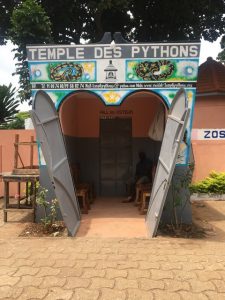 His voice droned on explaining that those who came here for guidance would come and wash from the water that the snakes drank from and through the high priest who would perform this ceremony, they would be given guidance to the problems of their lives and protected from the danger of the evil spirits. They even had a cemetery where any snake that died would be buried. Several times a month they open the door of the temple at night to let the pythons go out and hunt for small rats or mice. When the villagers find a snake in their village they simply pick it up and bring it back to the temple. I was glad to hear the final words of his story and walk out of this dark and fearful place.
His voice droned on explaining that those who came here for guidance would come and wash from the water that the snakes drank from and through the high priest who would perform this ceremony, they would be given guidance to the problems of their lives and protected from the danger of the evil spirits. They even had a cemetery where any snake that died would be buried. Several times a month they open the door of the temple at night to let the pythons go out and hunt for small rats or mice. When the villagers find a snake in their village they simply pick it up and bring it back to the temple. I was glad to hear the final words of his story and walk out of this dark and fearful place.
The history from the coast of West Africa is filled with sad history of the exploitation of its people. The cultures of the southern coast of West Africa have been cultures where they have placed great value in a hierarchical society where there are stratified layers of clans from royalty to slaves. The kings of these ethnic groups plundered and made their enemies their slaves. By force many of them lived in bondage against their will and in superstitious fear of those who could place a curse on them and ruin their lives and their families lives. When the slave trade came, the the kings simply sold their enemies into the hands of merchants.
One of the most notorious trails of tears was called the “way of the slaves” 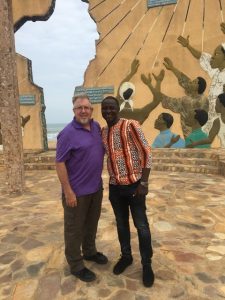 that started more than 200 kms in the interior of the country and led to the shores of what is today called the port of Cotonou. This way of the slaves ended in three final steps that sealed the fate of these slaves. First was the tree of forgetfulness. By marching around this tree, the slave train tied to each other with chain and shackles around their necks, would then symbolically and mystically forget their lives in Africa.
that started more than 200 kms in the interior of the country and led to the shores of what is today called the port of Cotonou. This way of the slaves ended in three final steps that sealed the fate of these slaves. First was the tree of forgetfulness. By marching around this tree, the slave train tied to each other with chain and shackles around their necks, would then symbolically and mystically forget their lives in Africa.
The second step was the Fort where they were kept for two weeks called the “room of darkness.” It was thought that if they were strong enough to survive this room in the heat and darkness then they could probably survive 3 months in the belly of a ship on their way to the Americas. Many died in the darkness and despair and never even made it to the boats.
The final step was the “tree of return.” This tree they would circle three times before walking through the “door of no return.” They were put in small pirogues and taken to the slave ships. They believed that if they circled the tree of return, then when they died in the foreign country, their spirits would return back to this soil to rest in the place from where they came from.
During the 400 years of the slave trade in Africa, it is estimated that at least 11 million slaves were taken from five main points of departure, this being one of them. It is also estimated that possibly that many more also lost their lives due to the cruel slave raids performed by the African chiefs, the brutal conditions of the slave trains on the way of the slaves, and the sickness and death that occurred on the slave traders ships. How long and dark were those years of injustice and death?
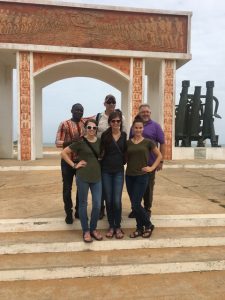 As I stood on the shore under the monument that celebrates the end of the slave trade, my heart was both relieved but saddened. The cries of the masses that suffered seemed to echo back from the waves and bounce of the walls showing the names of the Catholic sisters who came to share the good news of Christ redemption. It seemed like a hollow message when we realize that in the same forts where slaves were taken and treated like animals, was also a small catholic cathedral for the ship owners and colonists to worship in while they were on shore picking up their slaves.
As I stood on the shore under the monument that celebrates the end of the slave trade, my heart was both relieved but saddened. The cries of the masses that suffered seemed to echo back from the waves and bounce of the walls showing the names of the Catholic sisters who came to share the good news of Christ redemption. It seemed like a hollow message when we realize that in the same forts where slaves were taken and treated like animals, was also a small catholic cathedral for the ship owners and colonists to worship in while they were on shore picking up their slaves.
How different though were the previous two days of our mission trip here in Benin. I had flown into Cotonou to receive the staff members of the JFHP who had agreed to purchase tickets and deliver the last of the desperately needed equipment to West Africa. Randi, our team leader had brought her dad Brian, and Cassandra, had brought her friend Paige. We 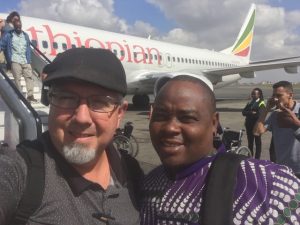 sat on comfortable wicker furniture under the shade of the covered terrace, with a light wind blowing to keep us comfortable. Across from us sat five servants of the Lord from as far as Togo, Niger, and the northern part of Benin.
sat on comfortable wicker furniture under the shade of the covered terrace, with a light wind blowing to keep us comfortable. Across from us sat five servants of the Lord from as far as Togo, Niger, and the northern part of Benin.
Their story was not of pain and suffering or shared with lifeless speech. They each seemed full of life, and light, and hope. One after the other they shared how God had used the Jesus Film to reach the lost in the remote areas where they are serving. Karim shared how his passion to reach the Gourmantche people group in the north had forced him to ask himself, “what bridge can we use to reach this nomadic people group?” He began to notice that many of the children who were attending school were not performing well to the national standards.
He approached a family and offered his services as a teacher to tutor their children for free. Every day he met them in the afternoon and helped them with their studies, teaching them French, arithmetic, and history. By the next term, the children from this family were the top of their class. Both the teachers and other parents wanted to know why this family’s children were doing so well. They then shared about the pastor in the village that helps children to study. Soon Karim was tutoring multiple families children. As the relationships grew and the trust developed, they began to ask him why he would do such a thing. Karim was able to share about the love of Christ that compelled him to help others. Soon this pastor had believers and started a church in the home of the first family as they all came to Christ.
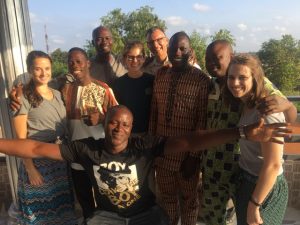 François began to share about the culture of the Gourmantche. He told us about the solidarity of the northern tribes. They were not like the south where there were people always trying to take advantage of one another. They did not believe in the same voodoo of the south but they trusted in their fetishes that protected them from evil. There they were proud of their ethnic groups but they also helped one another as it was just part of their culture to do so.
François began to share about the culture of the Gourmantche. He told us about the solidarity of the northern tribes. They were not like the south where there were people always trying to take advantage of one another. They did not believe in the same voodoo of the south but they trusted in their fetishes that protected them from evil. There they were proud of their ethnic groups but they also helped one another as it was just part of their culture to do so.
François shared how the people gathered together and decided that they must do something to help their children go to school. They tapped into a cultural practice that had been used in days gone by. If a family with means wanted to help another family in poverty, they would donate an animal to the child. The childe will rear that animal and once it was big enough to give off spring then one would be given back to the original donor. With the help of the church leaders, they decided to start this practice again with the orphans and the poor in their community. Everyone who could afford it gave one sheep or goat. Together they gathered 90 sheep and goats.
The chief of the village then gave one each of these animals to the children who were most needy no matter from what religion or background they came from. As the children raised the animal and it had babies they gave one back to the chief who then was able to give it to another child. In just 3 short years, this program has grown to 1,000 animals in this program. They haved created their own non-profit organization and today literally hundreds of children are going to school for the first time and many of them are part of the Gourmantche. We praise God because through these leaders and their faithfulness to love others with the love of God many have come to Christ. They have demonstrated the heart of Christ and with the Jesus film and the art of oral bible story telling, people are growing in their faith and winning many souls to Christ.
Per capita, the Church of the Nazarene in Benin has more churches in 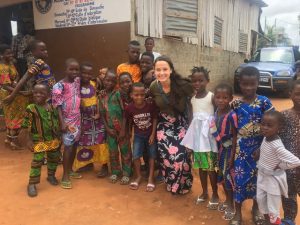 every province in every part of the country with more coverage than any other country in the world. In just a little over 12 years they have more than 1,250 churches in their country and close to 70,000 members of the Church of the Nazarene. Amazing! What a major change they are making in their communities. Whole households have been won to Christ and they are discipling them through audio bibles and mp3 players as families gather in the morning to listen to the word of God and pray before going to their gardens and places of work.
every province in every part of the country with more coverage than any other country in the world. In just a little over 12 years they have more than 1,250 churches in their country and close to 70,000 members of the Church of the Nazarene. Amazing! What a major change they are making in their communities. Whole households have been won to Christ and they are discipling them through audio bibles and mp3 players as families gather in the morning to listen to the word of God and pray before going to their gardens and places of work.
It is true that the history of this small country has had a very dark past, but today we see that there is hope of real change. Today our church has been recognized as a church that not only educates the children of their community, they have provided water wells to desolate places. They have started irrigation plans to develop cash crops and raise their communities out of poverty. They have banded together to fight against evil, they have loved their neighbors, and they have preached the gospel to the poor and set the captives free.
The tree of remembrance today is the tree of eternal life found in Jesus Christ. There is an answer to the room of darkness and deep superstition of the occult and voodoo that still permeates the society. It is the light of Christ that drives out the fear and replaces it with faith and hope. The thought of your spirit returning to a tree on the shore of the coast of Benin has been shattered by the cross and the knowledge that your soul will not end in this life but will return to heaven for a life where there will be no more suffering, no more crying, no more oppression.
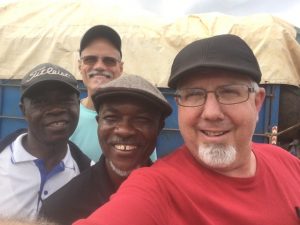 I sat in that circle with these leaders and thought to myself, these are the new warriors in a spiritual battle for the heart of this country. Satan will not easily let go of his territory. We need to pray over these men and women who are stepping into the darkness each day to shine the light of truth in their communities. As an international church we are called to be prayer warriors to this team. We are called to equip the saints with the tools they need, and we are here to encourage them in any way we can.
I sat in that circle with these leaders and thought to myself, these are the new warriors in a spiritual battle for the heart of this country. Satan will not easily let go of his territory. We need to pray over these men and women who are stepping into the darkness each day to shine the light of truth in their communities. As an international church we are called to be prayer warriors to this team. We are called to equip the saints with the tools they need, and we are here to encourage them in any way we can.
The next time you turn on the tap to wash your hands, remember there are those that walk up to 5 kms to get water that is not that clean just to do the same. The next time you walk into your finely decorated, climate controlled sanctuary with padded seats, remember that there are more than 1,000 churches in Benin who are worshipping on wood plank pews and thatched cover roofs and praising God with songs of thanksgiving for their freedom from bondage. The next time you open your selection of preferred translation of the bible in your heart language to read God’s Word, that there are thousands who are thirsting to even hear a single sentence of the words of Christ from an audio bible in their mother tongue because they cannot read.
Join us in celebrating these heroes of the faith! If you want to be part of 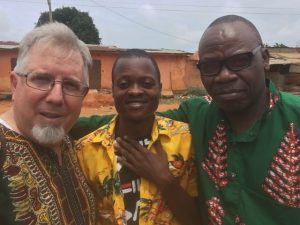 our team to transform Benin and other countries just like it in Africa by the power of Christ’s love, then check out the ways that you can help us through gifts to get more tools into the hands of these leaders, or support a well in a thirsty community in the sahel, or simply give this Christmas from your abundance the gift of an audio bible or a story scarf to these leaders who will effectively use it to bring more people to the knowledge of Christ.
our team to transform Benin and other countries just like it in Africa by the power of Christ’s love, then check out the ways that you can help us through gifts to get more tools into the hands of these leaders, or support a well in a thirsty community in the sahel, or simply give this Christmas from your abundance the gift of an audio bible or a story scarf to these leaders who will effectively use it to bring more people to the knowledge of Christ.
May God bless you as you prayer for our ministry among these great leaders and if you want to know more about how to get involved, please contact us at teby@africanazarne.org.
